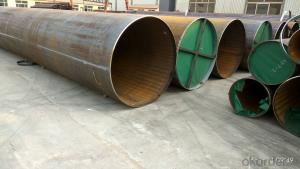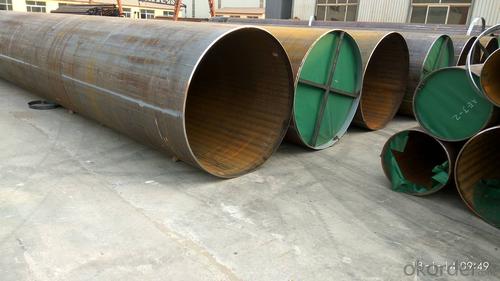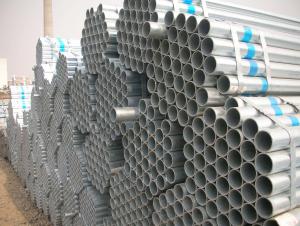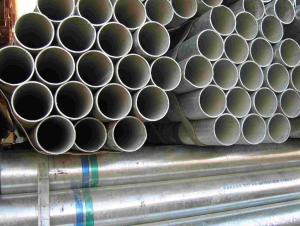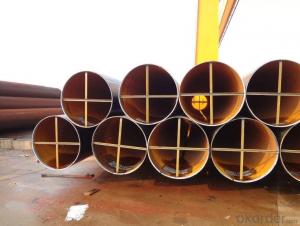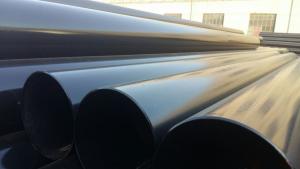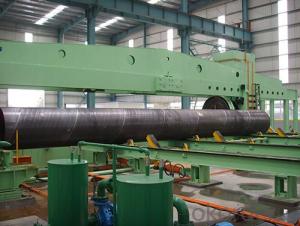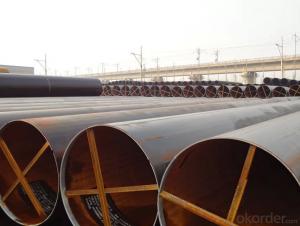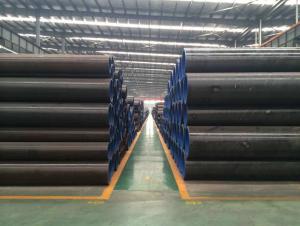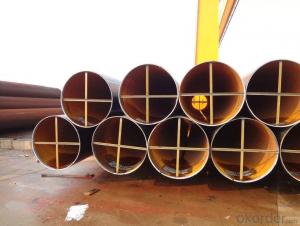Straight seam pipe Duplex submerged arc welding straight seam steel pipe
- Loading Port:
- Tianjin
- Payment Terms:
- TT OR LC
- Min Order Qty:
- 23 m.t
- Supply Capability:
- 32543 m.t/month
OKorder Service Pledge
OKorder Financial Service
You Might Also Like
Specification
Straight seam welding pipe is divided into ERW (high-frequency resistance welding), LSAW (direct seam welding L245 anti-corrosion straight seam welding pipe price, three-layer PE reinforced anti-corrosion,L360 anti-corrosion straight seam pipe,L415 anti-corrosion straight seam pipe,L290 anti-corrosion straight seam pipe API 5L PSL1 PSL2 GB/ t13793-2008
X40-x80 straight seam pipe, main use, screw pipe for sewage treatment, screw pipe for water purification, screw pipe for water plant, straight seam pipe for chemical enterprise in power plant, straight seam pipe for nuclear power plant, straight seam pipe for conveying combustible fluid and non-flammable fluid
Water pipeline ipn8710 anticorrosive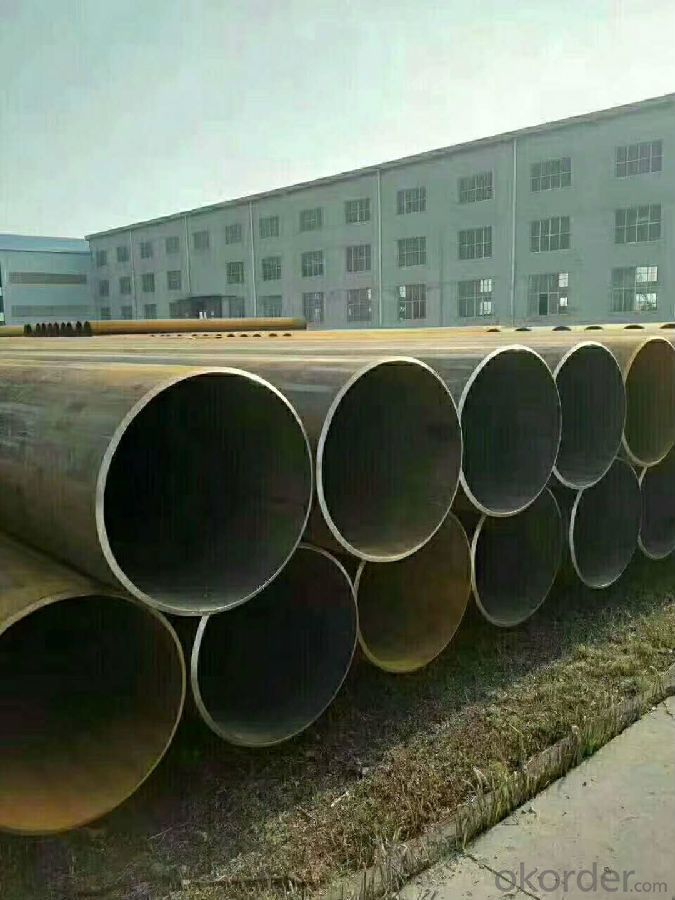
Spiral tube non-toxic water 8710 anti-corrosion steel pipe manufacturer, IPN8710 non-toxic anti-corrosion steel pipe, IPN8710 anti-corrosion steel pipe, IPN8710 nontoxic anticorrosive spiral steel pipe, wall IPN8710 anti-corrosion steel pipe, 3 PE anticorrosive pipe, epoxy coal tar anti-corrosion steel pipe, anti-corrosion steel pipe, cement mortar IPN8710 anti-corrosion steel pipe insulation pipe series have polyurethane foam insulation pipe, steel steel insulation pipe, prefabricated directly buried insulating pipe, steam directly buried insulating pipe, etc. The company by the high quality of spiral steel pipe, straight seam steel pipe, sea
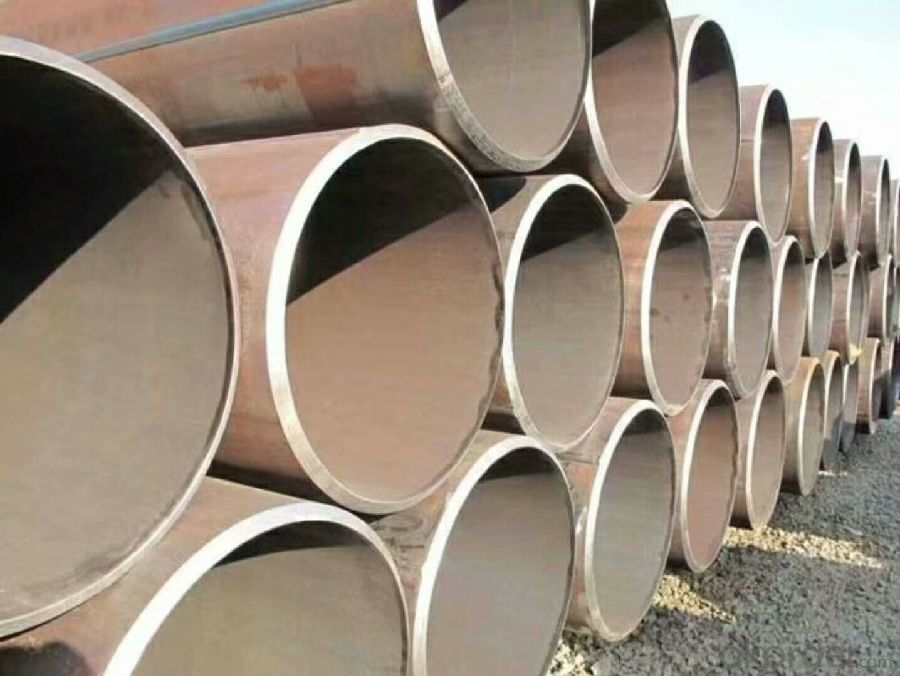
- Q: What is the average cost of steel pipes?
- Several factors, including size, grade, and quantity of steel pipes needed, as well as current market conditions, can cause the average cost of steel pipes to vary. Typically, steel pipes range in cost from $500 to $1500 per ton. Nonetheless, it should be emphasized that this is only a rough estimation, and prices may fluctuate due to factors such as demand, location, and quality. For more precise pricing information based on specific project requirements, it is advisable to contact suppliers or manufacturers.
- Q: How are steel pipes used in mining?
- Steel pipes find extensive use in mining operations for a range of purposes. In mining, one of the primary applications of steel pipes involves the transportation of materials, including water, slurry, and other liquids. These pipes possess exceptional durability and can withstand the harsh conditions typically encountered in mining environments, rendering them highly suitable for long-distance material conveyance. Furthermore, steel pipes serve as crucial components in mining ventilation systems. The provision of fresh air to workers and the elimination of harmful gases and dust are of paramount importance in the mining industry. Steel pipes are employed in the construction of ventilation shafts and ducts, facilitating the airflow throughout the mine and ensuring the safety of the miners in their working environment. Moreover, steel pipes contribute significantly to the construction of underground tunnels and mine shafts. By providing structural support and reinforcement, they effectively prevent collapses and maintain the stability of the mine. The strength and durability inherent in steel pipes make them the ideal choice for these critical applications in mining. Another noteworthy use of steel pipes in mining is for the extraction of resources. In certain instances, steel pipes are deployed to establish boreholes or wells, enabling access to underground deposits of minerals or water. Inserted into the ground, these pipes are instrumental in employing various techniques such as drilling or hydraulic fracturing to extract the desired resources. In summary, steel pipes play an indispensable role in the mining industry, serving an array of purposes, including material transportation, ventilation, structural support, and resource extraction. Their strength, durability, and ability to withstand adverse conditions make them an indispensable asset in mining operations.
- Q: What is the production process of seamless steel tube?
- Main production process of cold rolled (drawn) seamless steel tube:Blank preparation, pickling, lubrication, cold rolling (drawing), heat treatment, straightening, finishing and inspectionThe production process of seamless steel tube in general can be divided into two kinds of hot rolling and cold drawing, cold-rolled seamless steel pipe production process than hot-rolled billet to complex, first to three roller rolling and extrusion to sizing test, if the tube through the cutting machine cutting surface without crack growth response after cutting blank about one meter. Then enter the annealing process, annealing and pickling to use acid pickling liquid, should pay attention to the surface if there are a lot of bubbling, if there are a large number of bubbling pipe shows that the quality is not up to the standard. The appearance of cold rolling seamless steel tube shorter than hot-rolled seamless steel pipe, cold rolled seamless steel pipe wall thickness is generally higher than hot-rolled seamless steel pipe to be small, but the surface looks better than thick wall seamless steel pipe is more bright, rough surface is not too much, not too much burr diameter.
- Q: Can steel pipes be used for both high-pressure and low-pressure systems?
- Yes, steel pipes can be used for both high-pressure and low-pressure systems. Steel is known for its durability, strength, and resistance to extreme conditions, making it suitable for various applications. Whether it is transporting liquids or gases in high-pressure systems or low-pressure systems, steel pipes can efficiently handle the demands of both.
- Q: Can steel pipes be used for underground cable ducting?
- Yes, steel pipes can be used for underground cable ducting. Steel pipes are commonly used in underground cable ducting due to their strength, durability, and resistance to external factors such as corrosion and impact. They provide reliable protection for cables and are an effective solution for underground cable installations.
- Q: Can steel pipes be used for conveying natural gas?
- Yes, steel pipes can be used for conveying natural gas. Steel pipes have been widely used in the natural gas industry due to their strength, durability, and ability to withstand high pressure. Additionally, steel pipes are resistant to corrosion and provide a secure and reliable method for transporting natural gas over long distances.
- Q: Can steel pipes be used for underground transportation tunnels?
- Yes, steel pipes can be used for underground transportation tunnels. Steel pipes are commonly used in the construction of underground tunnels for various purposes such as transporting water, gas, and sewage. They are known for their durability, strength, and resistance to corrosion, making them suitable for underground applications. Steel pipes can withstand the weight and pressure exerted by the surrounding soil and can be reinforced to ensure stability. Additionally, steel pipes can be manufactured in various sizes and lengths, allowing for flexibility in tunnel design. However, it is essential to consider factors such as soil conditions, load-bearing capacity, and potential environmental impacts when deciding to use steel pipes for underground transportation tunnels.
- Q: How are steel pipes used in the manufacturing of desalination plants?
- Steel pipes are used in the manufacturing of desalination plants for various purposes such as transporting seawater, brine, and treated water within the plant. They provide durability, corrosion resistance, and the necessary strength to withstand high-pressure conditions, ensuring the efficient operation and long-term reliability of the desalination process.
- Q: What is the lifespan of a steel pipe?
- The lifespan of a steel pipe can vary depending on various factors such as its quality, maintenance, and usage conditions. However, with proper care and maintenance, a well-made steel pipe can last for several decades or even more.
- Q: What are the different methods of wrapping steel pipes for corrosion protection?
- There are several different methods of wrapping steel pipes for corrosion protection. These methods can vary depending on the specific application and environmental conditions. Some of the common methods include: 1. Tape Wrapping: This involves wrapping the steel pipes with a corrosion-resistant tape, such as polyethylene or polypropylene tape. The tape acts as a barrier between the pipe surface and the corrosive elements, preventing direct contact and reducing the risk of corrosion. 2. Inner Wrapping: Inner wrapping involves applying a protective coating or lining to the inside surface of the steel pipe. This method is commonly used for pipes that transport fluids or gases, as it provides an additional layer of protection against corrosion from the inside. 3. External Coating: External coating is a widely used method for corrosion protection. It involves applying a protective coating to the outside surface of the steel pipe. The coating can be a variety of materials, such as epoxy, polyethylene, or polyurethane, which provide a barrier against corrosive elements and extend the lifespan of the pipe. 4. Cathodic Protection: Cathodic protection is an electrochemical method used to protect steel pipes from corrosion. It involves connecting the steel pipe to a sacrificial anode, such as zinc or magnesium, which corrodes instead of the pipe. This process helps to prevent the corrosion of the steel pipe by diverting the corrosive current away from the pipe surface. 5. Heat Shrink Sleeve: Heat shrink sleeves are commonly used for corrosion protection in underground or submerged applications. These sleeves are made of a heat-activated material that shrinks when heated, creating a tight seal around the pipe. The sleeve forms an effective barrier against moisture and corrosive elements, preventing direct contact with the steel pipe. 6. Fusion Bonded Epoxy (FBE) Coating: FBE coating is a thermosetting powder coating that is applied to the surface of the steel pipe and then fused to form a protective layer. This coating provides excellent adhesion and corrosion resistance, making it a popular choice for steel pipes in various applications. It is important to note that the selection of the appropriate method for wrapping steel pipes for corrosion protection depends on factors such as the environment, the type of corrosive elements present, the intended application, and other specific requirements. Professional advice and consultation may be necessary to determine the most suitable method for a particular situation.
Send your message to us
Straight seam pipe Duplex submerged arc welding straight seam steel pipe
- Loading Port:
- Tianjin
- Payment Terms:
- TT OR LC
- Min Order Qty:
- 23 m.t
- Supply Capability:
- 32543 m.t/month
OKorder Service Pledge
OKorder Financial Service
Similar products
Hot products
Hot Searches
Related keywords
